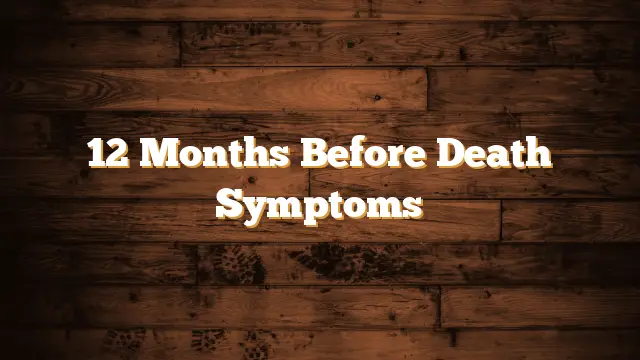Table of Contents
12 Months Before Death Symptoms
There are several signs that your loved one is nearing the end. One of these is reduced blood circulation. You may notice that they are more tired than usual. Another symptom is hallucinations. These symptoms may also occur several months before death. However, the signs are different for every person. In some cases, there are no noticeable symptoms until a year or more before death.
Symptoms of impending death
As a patient approaches the last days of life, the person’s skin may begin to appear mottled or blue and may be cool to the touch. It’s important to keep the dying person warm by offering blankets and covering the bed. Muscles may also become weak and simple tasks may become difficult. The person may also verbally or physically complain about pain.
In addition to these physical symptoms, a person nearing the end of life may be restless, picking at clothing and bed linens. Their body may be weaker, but any changes should be reported to a healthcare provider. These changes can occur during any stage of the disease, but may become more noticeable in the final days before death.
Symptoms of reduced blood circulation
As the body nears death, blood circulation starts to diminish. This is evident in the arms, legs, and skin. These areas will feel cool and mottled, and the skin may be paler or even blue or purple in color. The person’s lips and nail beds may also be pale or bluish.
The person’s ability to breathe can also decrease. He or she may develop weak muscles that make even the smallest tasks difficult. For example, a bedridden person might have difficulty turning over.
Symptoms of fatigue
Fatigue is one of the most common symptoms experienced by patients 12 months before death and typically increases in severity as the patient approaches the end of life. This multidimensional symptom often occurs in conjunction with drowsiness, weakness, and sleep disturbance. As a result, scores on the Palliative Performance Scale decrease rapidly in the last seven days of life. Although no clinical trials have been conducted, methylphenidate may be useful in the last few weeks of life.
As a dying person gets closer to death, they may become restless and begin to pick at clothes or bedsheets. This often makes them seem aimless. However, suddenly they may become more active and want to get up and interact with family members or eat food.
Symptoms of hallucinations
Hallucinations are a very common problem for people with dementia and schizophrenia. These hallucinations can make the person feel scared, frightened, nervous, or even paranoid. They can also be a result of extreme tiredness or a recent bereavement.
Visual hallucinations can also be frightening for older patients, and most people are reluctant to admit that they experience them. Therefore, clinicians need to be careful not to cause further distress. Instead, they should use a nonjudgmental, calm approach when treating patients with hallucinations.
Symptoms of weak muscles
Symptoms of weak muscles are often experienced by dying people. They become weak and may have difficulty performing simple tasks such as lifting objects or turning over in bed. If you are a caregiver to someone who is dying, you should help them as much as possible. If you find that they are losing the ability to move about, you should try to get them assistance.
Symptoms of congestive heart failure
Congestive heart failure is a serious condition that can lead to death within five years. Usually, people will have a life expectancy of one year or less. It’s caused by high blood pressure, diabetes, and heart disease. Its symptoms include shortness of breath that happens when you’re resting or doing a simple activity, and a persistent cough that produces pink or white mucus. Symptoms of congestive heart failure can also include disorientation and confusion, especially during the final stages.
As the disease progresses, the patient will experience increased fatigue, cognitive decline, increased confusion, and recurrent heart-related hospitalizations. They may also experience pain, unintentional weight loss, and increased anxiety. The symptoms of congestive heart failure are often difficult to treat but can be managed with the proper medical care.

